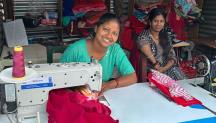.jpg?w=204&h=107&as=1&bc=ffffff&cc=1&hash=6DDCCBE0B68D92CE2D49CB74F32FD0F3)
.jpg?w=201&h=105&as=1&bc=ffffff&cc=1&hash=B779C253822707CF4D9C7092FE89E839)
IRENA active in international efforts to promote energy efficiency and renewable energy for citizens
Newsletter
At a special session of the Energy Day in the context of Rio+20, experts exchanged knowledge and experience to enhance energy efficiency and renewable energy for making cities sustainable. The session was moderated by Dolf Gielen, Director, IRENA Innovation and Technology Centre, International Renewable Energy Agency. The discussion centered on action that can be taken to drive renewable energy into cities.
The panelists were: Sigurd Heiberg, Chairman, UNECE Committee on Sustainable Energy; Jim Walker, Co-founder, The Climate Group; Josh Henretig, Senior Manager Environmental Sustainability, Microsoft; RA Rajeev, Commissioner, Thane Municipal Corporation, Thane City, India.
Cities consume 66% to 75% of global energy use, and this share will continue to growth with an additional 1.5 billion people entering cities before 2030. The rate of urbanisation is particularly high in Asia and Africa, where urban populations will grow with 1 200 million and 450 million respectively. Although several new mega-cities will be established in the next 18 years, small-size urban towns (less than 0.5 million population) will be the fastest growing segment (UN 2004).
Sustainable energy has an impact on people’s quality of life. It can reduce local air pollution, fuel economic growth, improve housing, support the development of sustainable transport systems, provide modern energy sources and employment opportunities to those that are living in slums, and reduce the projected growth in urban solid waste.
The large quantities and inefficient use of energy in cities provide tremendous opportunities for the introduction of sustainable energy. Although the specific opportunities highly depend on local conditions, such as climatic and infrastructural conditions, renewable resource availability, urban design, existing building stock, and financial and investment climates, there are several possible categories and combinations of activities that cities can use to introduce sustainable energy:
-
Developing sustainable urban infrastructure for low carbon cities, including sustainable transport, water, waste, material and nutrient management;
-
Urban design, green buildings, energy efficient (public) lighting, and district heating options;
-
Smart grids and metering, distributed energy production, renewables, the introduction of carbon free energy carriers, and storage;
-
Sustainable policy development, including promotion of sustainable behaviours.
City leaders can directly influence urban planning projects, or instigate local policies to promote sustainable energy. In those cases where are directly involved in the provision of electricity or heat to urban dwellings, they also have access to valuable data that can be used for forward planning, balancing of energy supply and demand, and improving energy efficiency.




